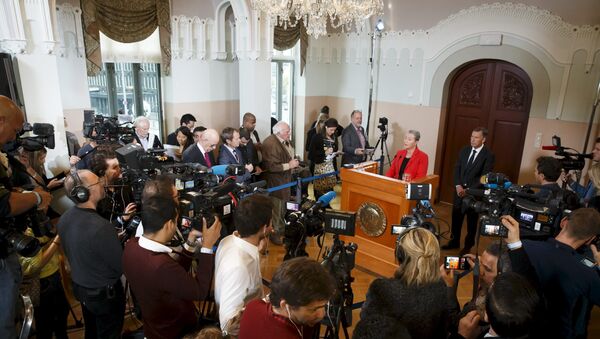MOSCOW (Sputnik) — The award ceremony is being held annually on December 10 – the anniversary of the death of the man who invented dynamite, Alfred Nobel, the founder of the Nobel Awards and a Swedish industrialist. At the ceremony in Stockholm, the Nobel Prizes in Chemistry, Literature, Physiology or Medicine, Physics and the Prize in Economic Sciences are being presented to the Nobel Laureates.
This year's Nobel Prize laureates, who have been announced previously, are from Belarus, Canada, China, Ireland, Japan, Sweden, Turkey, the United Kingdom and the United States.
Ireland's William C. Campbell and Japan's Satoshi Omura will receive half of the 2015 Nobel Prize in Physiology and Medicine "for their discoveries concerning a novel therapy against infections caused by roundworm parasites." Youyou Tu from China will receive the second half "for her discoveries concerning a novel therapy against Malaria."
The scientific researches of Sweden's Tomas Lindahl, Paul Modrich of the United States, and Aziz Sancar, who has both US and Turkish citizenship, in the sphere of "mechanistic studies of DNA repair" will be honored with the 2015 Nobel Prize in Chemistry.
During the ceremony, Japanese physicist Takaaki Kajita together with his Canadian counterpart Arthur McDonald will receive the Nobel Prize in Physics "for the discovery of neutrino oscillations, which shows that neutrinos have mass."
For the first time in the history of Belarus, its representative Svetlana Alexievich will be awarded the Nobel Prize in Literature "for her polyphonic writings, a monument to suffering and courage in our time."
The only Nobel Prize that was established in 1969, but not under the will of Nobel, is the Sveriges Riksbank Prize in Economic Sciences in Memory of Alfred Nobel. In 2015 it will be granted to Angus Deaton, a citizen of both the United States and the United Kingdom "for his analysis of consumption, poverty, and welfare."
On December 10, the Nobel Peace Prize Award Ceremony is also expected to take place in the Norwegian capital of Oslo, where the Peace Prize will be awarded to the Tunisian National Dialogue Quartet. The organization has helped to resolve the conflict that almost led the country to the brink of civil war. This award is being given separately from the others, due to Nobel's will to give the Norwegian parliament the right to decide who receives the award.



